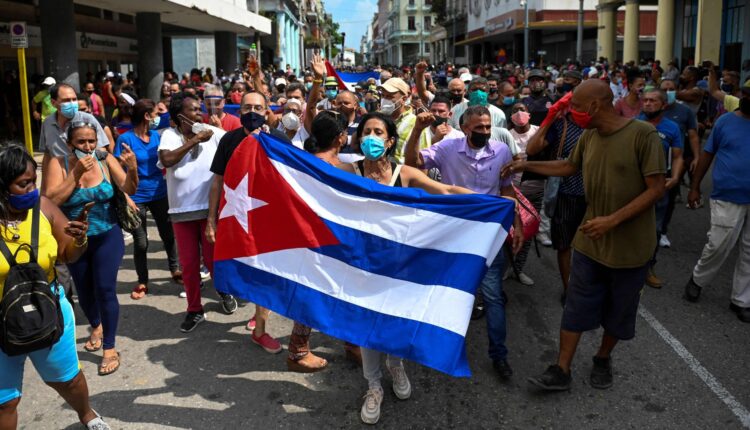
Cuba: Unrest and interference
A La Jornada Editorial
Thousands of Cubans demonstrated last Sunday against the shortage of basic items, the shortage and the intermittent power cuts, among other demands. In a completely unusual way in the protests that take place on the island, during the marches there were looting of shops and attacks on police patrols, as well as violent arrests of those who caused excesses.
In response, President Miguel Díaz-Canel appeared at the protest held in the town of San Antonio de los Baños to listen to the demands of the population and explain the reasons for the hardships afflicting the country. The president acknowledged that not all the protesters are “far from being counterrevolutionary,” but “dissatisfied” people, but he also denounced the destabilization campaign hatched by the Cuban-American mafia, and argued that “those who encourage these demonstrations do not want the well-being of the people, but the privatization of health and education, neoliberalism.”
It would be childish to deny that in that country, as in many others, there is a social sector dissatisfied with the authorities and determined to take to the streets to make their demands. It is known, on the other hand, that this malaise has been exacerbated and widened as a result of the prolonged pandemic that has paralyzed tourism, one of the main sources of employment and income on the island. On the other hand, it is clear that the difficulties experienced by millions of Cubans originate, in part, from government inefficiencies and bureaucratic inertia.
However, it would be enormously naive to believe that there is no promotion of these demonstrations from Washington and Miami, and it would be absurd to ignore the weight that the six decades of the U.S. blockade against the island have had in the gestation of this social anger, since this brutal and permanent violation of the human rights of all Cubans is expressly designed to generate discontent against the regime and subdue it through hunger and general deprivation.
In the current circumstances, the hostility of the United States against Havana is inserted, moreover, as a strange force that clouds the legitimate claims of Cuban society and obscures the understanding of its discomforts.
For this reason, President Joe Biden’s call for the Cuban government to “attend to the needs” of its people in this vital moment is an unprecedented perversity: it is the US blockade and not the Cuban authorities that prevents the island from acquiring the basic supplies to deal with the pandemic, and the first measure to end the “economic suffering” denounced by the Democratic politician is to lift the embargo that has kept Cuban trade and finance tied up for more than half a century.
It is clear that the only sensible attitude to the difficulties facing the island is to let Cubans themselves decide what they want to do with their country. As President Andrés Manuel López Obrador expressed yesterday, the situation of the Cuban people should not be used to intervene in internal affairs by an independent, free and sovereign nation, whose government and citizens must seek a solution through dialogue.

